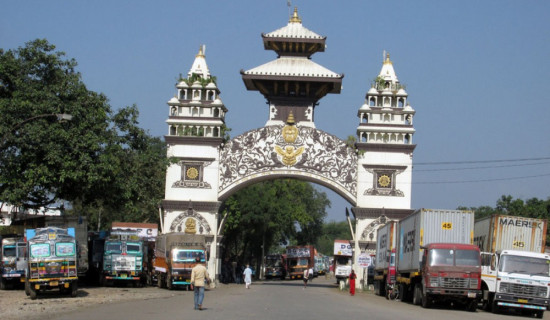- Sunday, 15 February 2026
Row Over Embossed Number Plates
Uttam Maharjan
The Department of Transportation Management (DoTM) on June 3 issued a notice making embossed number plates (ENPs) on all types of vehicles mandatory effective from July 17, failing which the vehicle owners would be subject to penalties as stipulated in the Motor Vehicles and Transport Management Act 1993. In accordance with the act, those who fail to install ENPs on their vehicles will be fined an amount ranging from Rs. 5,000 to Rs. 15,000, will have their vehicles confiscated and will be sentenced to one year in jail. The penalties are very harsh, to say the least.
The notice drove many people panicky, making them crowd the transport management offices in Bagmati and Gandaki states. At the same time, the DoTM had to collect brickbats from various quarters as it would not be possible to install ENPs on all vehicles within a span of 40 days. The DoTM then backtracked from the move, clarifying that not all vehicles were required to have ENPs by July 17. As per the clarification, ENPs will be mandatory on new vehicles registered after November 17, 2021, on vehicles whose ownership was transferred after February 13, 2022 and on vehicles whose ownership was renewed after May 15, 2022.
Interim plan
The plan of introducing ENPs was first incorporated in the three-year interim plan (2007-10) but the plan remained in limbo as no relevant study had been made. However, the DoTM inked an agreement with a subsidiary company of Tiger IT Bangladesh for the installation of ENPs on 2.5 million vehicles at a cost of USD 44 million and started distributing the number plates beginning in the same month.
The distribution process was going on although at a snail’s pace when the Supreme Court issued a stay order on February 22, 2018 against the distribution of ENPs in response to a writ petition filed by Bharat Basnet, an environmentalist. The petitioner demanded that the Devanagari font be used instead of the English font on ENPs and argued that the microchip fitted into an ENP could be used for spying, threatening national security.
On December 13, 2019, the Supreme Court vacated its stay order, setting the stage for resuming the distribution of ENPs. In November 2020, the DoTM planned to install ENPs on all vehicles within one year. The plan could not materialise owing to the COVID-19 pandemic. The DoTM tried to fast-track the process by making it mandatory for all vehicles to have ENPs with effect from July 16, 2021. Despite its all-out efforts, the DoTM could not meet its target. In the meantime, the government published a notice in the Nepal Gazette on November 8, 2021. On the basis of this notice, the DoTM tried to make ENPs mandatory for all vehicles from July 17, 2022 but it had to face a backlash.
ENPs are scientific number plates that have many useful features. They will provide both safety and security for vehicles. They are camera-readable and easily trackable with in-built GPS systems. They will help in collecting revenue, keeping digital records, preventing theft and tracking road accidents. Even if ENPs are the need of the hour, there are several issues. In the first place, ENPs are costly vis-à-vis manual number plates. The cost ranges from Rs. 2,500 for two-wheelers to Rs. 3,600 for heavy vehicles. There are public complaints about the quality and long-term reliability of ENPs. As per the complaints, ENPs are not strong; they are subject to breakage or damage. It is not easy to get a replacement for a broken or damaged ENP.
The government has not put necessary infrastructure in place. RFID (radio-frequency identification) gates are yet to be constructed. ENPs are fitted with RFID microchips. So the people are miffed at the DoTM that it is forcing them to install ENPs on their vehicles when it has not made technical preparations. The integrity of the company that supplies ENPs has also been questioned. Tiger IT Bangladesh was blacklisted for fraud by the World Bank in 2019.
Although the DoTM publishes notices regarding the mandatory installation of ENPs on vehicles, it has not been shown its efficiency. When the agreement was made, there were 2.5 million vehicles, which have since increased to 3.7 million. The distribution process is very slow. Till now, 25,000 or 26,000 vehicles have got ENPs, which is a drop in the bucket. Government vehicles alone number around 40,000. The DOTM has not been able to install ENPs on all government vehicles.
In the Kathmandu Valley, four places have been set aside for the installation of ENPs: DoTM, Gurjudhara for two-wheelers, Vehicle Fitness Centre, Teku for three-wheelers and four-wheelers, DoTM, Ekantakuna for heavy vehicles and DoTM, Minbhawan for government vehicles. The number of mechanics assigned for the installation of ENPs is limited. At Vehicle Fitness Centre, Teku, around 50 vehicles get ENPs a day. And new vehicles enter the country on a regular basis. At this rate, it will take years to install ENPs on all vehicles.
Target
The DoTM has a target of installing ENPs on all vehicles within 16 months. The June 3 notice says that all vehicles whose ownership was renewed after May 15 have to have ENPs. This implies that all vehicles will have got ENPs by the end of the next fiscal year, which is not possible.
The DoTM has 250,000 ENPs in stock. If the target is to be achieved, the distribution process should be accelerated. For this, installation yards should be increased, mechanics should be increased accordingly and procedures should be simplified. Based on the figure of 2.5 million vehicles, ENPs have to be installed on around 5,000 vehicles per day to achieve the said target within 16 months. Therefore, it behoves the DoTM to formulate an efficient, fool-proof strategy to achieve its target.
(Maharjan has been regularly writing on contemporary issues for this daily since 2000. uttam.maharjan1964@gmail.com)

















